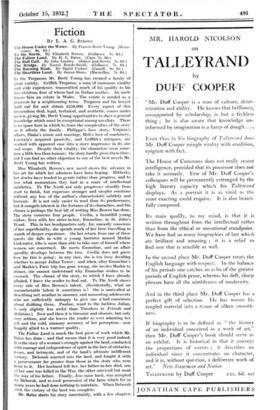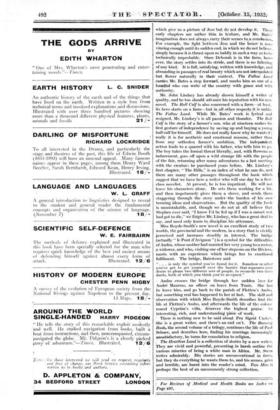Fiction
BY L. A. G. STRONG The House Under the Water. By Francis Brett Young. (Heine- mann. 8s. 6d.) Ix the Tregarons Mr. Brett Young has created a family of great variety. Griffith Tregaron, a man of enormous vitality and wide experience, transmitted much of his quality to his live children, four .of whom Shad an Italian mother. An uncle leaves hini an estate in Wales. The estate is needed as a reservoir by a neighbouring town. Tregaron and his lawyer hold out for and, obtain £250,000. Every aspect of this tremendous 'deal, legal, technical, and aesthetic, comes under review, giving Mr. Brett Young opportunities to show a general knowledge which must be exceptional among novelists. There is no space here in which to trace the complexities of the story as it affects the family. Philippa's love story, Virginia's affairs, Diarta'S music and marriage, Rob's love of machinery, Lnerezia's acquired passivity, and Griffith's intrigues, are worked with apparent ease into a story impressive. in its size
and scope. Despite their vitality, the characters seem some- how a little less than human ; the story hardly gives them time ; but I can fwd no other objection to one of the best novels Mr. Brett Young his written.
Miss Elizabeth Bowen's new novel shows the advance in her art for which her admirers have been hoping. Hitherto, her stories have tended to gyrate rather than progress, and to lose what momentum they had in a maze of intellectual subtleties. To The North not only progresses steadily from
start to finish, but expresses stronger and simpler emotions without any loss of the author's characteristic subtlety and humour. • It is not only easier to read than its predecessors, butB.compels interest in the fortunes of its characters, and the climax is perhaps the best bit of writing Miss Bowen has done.
The story concerns four people. Cecilia, a beautiful young widow, lives with her sister-in-law, Emmeline, in St. John's
Wood. This in her headquarters only, for, uneasily conscious of her superficiality, she spends much of her time travelling in search of deeper experience. On her return from one of these
quests she falls in with a young 'barrister named Markie l.inkwater, who is more than able to take care of himself where women are concerned. He meets Emmeline, and an affair speedily develops between the two. Cecilia does not guess how far thisis going ; in any case, she is too busy deciding whether to accept Julian Tower ; and when, after Emmeline's and Markie's Paris trip has gone wrong, she invites Markle to dinner, site cannot understand why Emmeline wishes to be excused. The climax of the story, to which I have already alluded, I leave the reader to find out. To The North shows every side of Miss Bowen's talent. (Incidentally, what an uncomfortable talent, it sometimes is ! She is unrivalled at describing wet weather in .summer, and nauseating adolescents who are sufficiently unhappy to give one a bad conscience about_ disliking them. ,Pauline,_ ward to the luckless Julian, is only slightly less awful than Theodora. in Friends and
Relations.) Now and then it is tiresome and obscure, but only very seldom, and she leaves the reader as ever admiring her wit and the cold, uncanny accuracy of her perception—now
happily allied to a warmer quality.. _ .
The Fallow Land is much the best piece of work which Mr. Bates has done ; and that means that it is very good indeed. it is the story of a woman's struggle against the land, conducted with courage and independence of spirit in the face of obstacles,
losses, and betrayals, and of the land's ultimate indifferent victory. Deborah married into the land, and fought it with
a perseverance far greater than those in the story who were bon to it. Her husband left her, her father-in-law died, one of her sons was killed in the War, the other survived but went the Way of his father. Finally, Jess came back, was accepted by Deborah, and re-took possession of the farm which for so many years he-had done nothing to maintain. When Deborah (lied, the victory of the land was complete.
Mr. Bates starts his story uncertainly, with a few chapters which give us a picture of JeSs" but d6 not develop it. These early chapters are rather thin in texture, and Mr. Bates' -imagination does not always carry their scenes to_a conclusion. For example, the fight -betiveen jesS and the boxer is eon-
Vineing enough until its sudden end, in which we do not believe, simply because it is thrust upon us baldly in such a way as to be technically improbable.' Once Deborah is in the farm, how-
ever, the story settles into its stride,- and there is no faltering
of any kind.' It is full, 'satisfying, written with knowledge-, and abounding in passages of real-beauty which are not interpolated but flower naturally in their context. The Fallow Land carries Mr. Bates a step forward, and marks him as one of a haadful who can write of the country with grace -and with authority.
Mr. John Lindsey has already shown himself a writer of quality, and he too should adVance hiS reputation with his new novel, The Bull Calf is also concerned with a farm—at least,
its hero starts on a farm—but in all other respects it is unlike. The Fallow Land. While Mr. Bates' work is lyrical and resigned, Mr. Lindsey's is all passion and thunder. The Bull
Calf is the story of a farmer's son, who at nineteen makes his first gesture of independence by saving up and buying a young bull calf for himself. He does not really knowwhy he wants it ;
really it is for aesthetic and emotional reasons, rather than from any orthodox farmer's ambition.., The independent
action leads to a quarrel with his father, who tells him to go. The boy takes the formal threat literallY, and, with Rowena as inducement, goes off upon a wild strange life with the people of the fair, returning after many adventures to a last meeting with the creaturz he purchased years before. Mr. Lindsey's
first chapter, " The Hills," is an index of what he can do,, and there are many other passage's throughout the book which suggest that we have here a writer who will one day be a first- class novelist. At pre'sent, he is too impatient. He will not leave his characters alone. He sets them working for a bit, and then impetuously gives them a shove, and sends them staggering through the story under-the burden of --his- own ' teeming ideas and .obie.rvations. /lilt the quality of the hook is unmistakable, and, though we do not at all believe that Stephen ever said, "I know I'd be fed up if I was a sunset wot had got to die," IN:eragi-V6 Mi. Lindsey; Who has- a great deal to say, and need only learn to discipline his utterance.
Miss Royde-Smith's new novel is an excellent study of two worlds, the provincial and the modern, in a story that is vividly perceived and increases steadily in interest. The bridge (actually " le Pont d'Avignon ") is a symbol for the difficulties of Andra, whose mother had married her very young to a rector, a widower, and who, visiting one of her stepsons on the Riviera, meets with an experience which brings her to emotional fulfilment. The bridge, Bairstowe said
" . . . is only the symbol you've found for it. Somehow or other you've got to get yourself over the barrier that separates your desire to please two different sets of people, to reconcile two stan- dards, both of which you think you've accepted."
- Andra crosses the bridge through her sudden love for Andre Maurras, an officer on leave from Tunis. She has to leave him, and go back to the parish of Fletten's Ambo,
but something real has happened to her at last. The skill and Observation with which Miss Roy-de-Smith describes first the life at Fletten's Ambo, and afterwards the life of the colony- round Cyprinn's villa, deServes the highest - prat-
interesting, rich, and Understanding Pleee of work.
There is nothing new to be said abort Fru Sigrid Undset.
She is a great writer, and there's an end on't. The Burning Bushy the second volume of. a trilogy, continues the life -of Paul
$eltner, and describes how, finding, his marriage increasingly nnsatisfactory, he turns for consolation to religion. -
The Heartless Land is a: collection of stories by a new writer. They are vivid and powerful, presenting in harsh outline the :various miseries of being a white man in Africa. Mr. Stem writes admirably. His stories are unconventional in form; -but they do everything he wants them to, and his scenes, grim and terrible, are burnt into the reader's mind. Two Men
perhaps the best of an uncommonly, strong collection.



























































 Previous page
Previous page